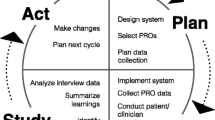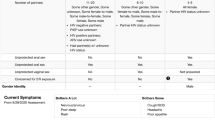Abstract
Purpose
To develop a prototype website to collect patient-reported outcomes in outpatient clinical oncology and link the data with the electronic medical record (EMR).
Methods
A multidisciplinary Research Network, including experts in outcomes research, clinical oncology, nursing, social work, information technology, EMRs, behavioral science, decision science, clinical trials, law, and a cancer survivor, was formed to design the prototype website. The Research Network developed the initial website specifications, elicited feedback from patients (n = 20) and clinicians (n = 7), constructed the website, and conducted usability testing (n = 10).
Results
Clinicians reported that the website could improve clinical practice if it was not burdensome and were most interested in tracking change over time. Patients were interested in using the website because of the potential to facilitate communication with their clinicians. Patients emphasized the importance of short and simple surveys and a user-friendly interface. The PatientViewpoint website was designed to meet these specifications. Usability testing suggested that patients had few problems accessing and using the site.
Conclusions
Preliminary reports from clinicians and patients suggest that a website to collect PROs and link them with the EMR could help improve the quality of cancer care. Further pilot-testing will evaluate the use, usefulness, and acceptability of PatientViewpoint.

Similar content being viewed by others
Abbreviations
- EMR:
-
Electronic medical record
- HRQOL:
-
Health-related quality of life
- PRO:
-
Patient-reported outcome
References
Valderas, J. M., Kotzeva, A., Espallargues, M., Guyatt, G., Ferrans, C. E., Halyard, M. Y., et al. (2008). The impact of measuring patient-reported outcomes in clinical practice: a systematic review of the literature. Quality of Life Research, 17, 179–193.
Marshall, S., Haywood, K., & Fitzpatrick, R. (2006). Impact of patient-reported outcome measures on routine practice: A structured review. Journal of Evaluation in Clinical Practice, 12, 559–568.
Detmar, S. B., & Aaronson, N. K. (1998). Quality of life assessment in daily clinical oncology practice: A feasibility study. European Journal of Cancer, 34, 1181–1186.
Detmar, S. B., Muller, M. J., Schornagel, J. H., Wever, L. D. V., & Aaronson, N. K. (2002). Health-related quality-of-life assessments and patient-physician communications. A randomized clinical trial. JAMA, 288, 3027–3034.
McLachlan, S. A., Allenby, A., Matthews, J., Wirth, A., Kissane, D., Bishop, M., et al. (2001). Randomized trial of coordinated psychosocial interventions based on patient self-assessment versus standard care to improve the psychosocial functioning of patients with cancer. Journal of Clinical Oncology, 19, 4117–4125.
Greenhalgh, J., & Meadows, K. (1999). The effectiveness of the use of patient-based measures of health in routine practice in improving the process and outcomes of patient care: A literature review. Journal of Evaluation in Clinical Practice, 5, 401–416.
Taenzer, P., Bultz, B. D., Carlson, L. E., Speca, M., DeGagne, T., Olson, K., et al. (2000). Impact of computerized quality of life screening on physician behaviour and patient satisfaction in lung cancer outpatients. Psycho-Oncology, 9, 203–213.
Velikova, G., Brown, J. M., Smith, A. B., & Selby, P. J. (2002). Computer-based quality of life questionnaires may contribute to doctor–patient interactions in oncology. British Journal of Cancer, 86, 51–59.
Velikova, G., Booth, L., Smith, A. B., Brown, P. M., Lynch, P., Brown, J. M., et al. (2004). Measuring quality of life in routine oncology practice improves communication and patient well-being: A randomized controlled trial. Journal of Clinical Oncology, 22, 714–724.
Greenhalgh, J. (2009). The applications of PROs in clinical practice: What are they, do they work, and why? Quality of Life Research, 18, 115–123.
Mullen, K. H., Berry, D. L., & Zierler, B. K. (2004). Computerized symptom and quality-of-life assessment for patients with cancer Part II: Acceptability and usability. Oncology Nursing Forum, 31, E84–E89.
Berry, D. L., Trigg, L. J., Lober, W. B., Karras, B. T., Galligan, M. L., Austin-Seymour, M., et al. (2004). Computerized symptom and quality-of-life assessment for patients with cancer Part I: Development and pilot testing. Oncology Nursing Forum, 15, E75–E83.
Jones, J. B., Snyder, C. F., Wu, A. W., & Website for Outpatient QOL Assessment Research Network. (2007). Issues in the design of Internet-based systems for collecting patient-reported outcomes. Quality of Life Research, 16, 1407–1417.
Basch, E., Artz, D., Iasonos, A., Speakman, J., Shannon, K., Lin, K., et al. (2007). Evaluation of an online platform for cancer patient self-reporting of chemotherapy toxicities. Journal of the American Medical Informatics Association, 14, 264–268.
National Institutes of Health. (2004). RFA-RM-04-014 Meetings/networks for methodological development in interdisciplinary research. Available at: http://grants1.nih.gov/grants/guide/rfa-files/RFA-RM-04-014.html. Accessed 10 March 2009.
McHorney, C. A., & Tarlov, A. R. (1995). Individual-patient monitoring in clinical practice: Are available health status surveys adequate? Quality of Life Research, 4, 293–307.
Acknowledgments
The authors would like to thank the Website Development Team (Michelle Campbell, Ray Hamann, John Hildebrand, Laxmi Machavarapu) and Bryce Reeve, PhD, our National Cancer Institute project officer. This research was funded by a grant from the National Cancer Institute (R21 CA113223-01, Dr. Albert Wu, PI). Dr. Snyder is supported by a Mentored Research Scholar Grant from the American Cancer Society (MRSG-08-011-01-CPPB).
Author information
Authors and Affiliations
Consortia
Corresponding author
Additional information
The details of the “Website for Outpatient QOL Assessment Research Network” is found in the “Appendix”.
Appendix
Appendix
Neil Aaronson, PhD (Netherlands Cancer Institute, Amsterdam, the Netherlands); Michael Brundage, MD, MSc (Queen’s University, Kingston, ON, CA); Carolyn Gotay, PhD (University of British Columbia, Vancouver, BC, CA); James Hodge, JD (Johns Hopkins Bloomberg School of Public Health, Baltimore, MD, USA); Denise Hynes, RN, MPH, PhD (Edward Hines, Jr. VA Hospital, Hines, IL and University of Illinois, Chicago, IL, USA); J.B. Jones, PhD (Geisinger Health System, Danville, PA, USA); Claire Snyder, PhD (Johns Hopkins School of Medicine, Baltimore, MD, USA); John Wasson, MD (Dartmouth University, Hanover, NH, USA); Albert Wu, MD, MPH (Johns Hopkins Bloomberg School of Public Health, Baltimore, MD, USA); Susan Yount, PhD (Northwestern University, Chicago, IL, USA); Brad Zebrack, PhD, MSW, MPH (University of Michigan, Ann Arbor, MI, USA).
Rights and permissions
About this article
Cite this article
Snyder, C.F., Jensen, R., Courtin, S.O. et al. PatientViewpoint: a website for patient-reported outcomes assessment. Qual Life Res 18, 793–800 (2009). https://doi.org/10.1007/s11136-009-9497-8
Received:
Accepted:
Published:
Issue Date:
DOI: https://doi.org/10.1007/s11136-009-9497-8




